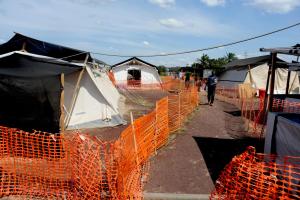Nutrition integrated into the fight against cholera in the Democratic Republic of the Congo
Kinshasa ‒ In the Democratic Republic of the Congo, where 47.9% of children aged below five years suffer from chronic malnutrition and 81.1% of those aged between 6 to 23 months do not get adequate nutrition, integrating appropriate nutrition into disease control is crucial to strengthening the country's response to health crises.
In 2023, the Democratic Republic of the Congo was hit by an outbreak of cholera, an acute diarrhoeal disease caused by the ingestion of contaminated food or water. More than 52 000 cases and 470 deaths were recorded in 15 of the country's 26 provinces that year and more than 22 000 additional cases, including 281 deaths, were recorded between 1 January and 28 July 2024. If left untreated, cholera can kill within a few hours.
“It is more difficult for malnourished people to recover from cholera and their treatment is more complex because the disease worsens their malnutrition, creating a vicious circle that complicates their recovery,” explains Dr Boureima Hama Sambo, WHO Representative in the Democratic Republic of the Congo.
In 2023, the National Nutrition Programme, the National Institute of Public Health and World Health Organization (WHO) published the "Guide to food and nutritional support in the context of health emergencies in the DRC", calling for a holistic approach to crisis management. In response to the epidemic, the Ministry of Health set up cholera treatment centres close to the affected population, which also provide nutritional support to patients.
Most treatment centres also provide nutritional support to patients in all affected provinces of the country in order to mitigate the risk of the disease spreading from the treatment centre to the community as a result of interactions between cholera patients and their relatives.
Cholera causes considerable loss of vital nutrients such as sodium, potassium, zinc, chlorine, proteins and carbohydrates. "We are focusing on foods that replace these lost nutrients in a bid to boost the patients' immune system and speed up their recovery," notes Dr Basile Ngoy, chief medical officer of the Kisanga health zone in Haut-Katanga Province, where five cholera treatment centres were set up. "There are also medications which cannot be taken without a proper diet," he added.
Thanks to the integration of nutritional support into treatment plans, there has been a significant improvement in the recovery rate in the country.
“During the four days my son was in hospital, meals were provided to us. Breakfast, lunch, and dinner,” says Annie, a trader whose child was seriously ill. "On the third day, he regained his strength, especially since we do not have such large servings of meals at home."
“We prioritize nutritional support for cholera patients by adapting meals to their specific needs,” explains Rebecca Bupele, a nurse at the Kisanga cholera treatment centre. “We prepare nutritious meals suitable for adults and children and advise parents on how to best take care of them. Rice is a key part of our therapeutic meal plan. It is particularly effective in reducing diarrhoea and preventing dehydration, while being readily available and easy to prepare, even with limited resources.”
Cholera particularly affects people who do not have access to basic sanitation services or who lack good hygiene practices, such as hand washing, drinking clean water, and eating hot food. WHO also supports chlorine water treatment actions in the most affected health zones.
“The conditions here are extremely precarious. “Without the nutritional support provided by WHO, we would face enormous challenges in patient care,” says Rebecca Bupele. “This approach allows us to use all the means necessary to save a life. Every gesture counts and I do it without hesitation.”
Communications and marketing officer
Tel: + 242 06 520 65 65 (WhatsApp)
Email: boakyeagyemangc [at] who.int (boakyeagyemangc[at]who[dot]int)
Chargée de communication
Tél : +243 899 330 358
Email: dimegnim [at] who.int (dimegnim[at]who[dot]int)



